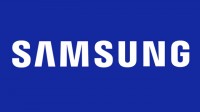Samsung 5-Year Plan Speeds Advanced-Chipmaking Timeline
October 5, 2022
Samsung wants to dominate the global market for advanced semiconductors, unveiling plans to begin producing chips with a 2-nanometer spec in 2025 and launching into the even more advanced 1.4-nanometer market in 2027. The timeline takes the South Korean company beyond the 3-nanometer chip production it began in June. Samsung says it will more than triple production capacity in five years, positioning it to challenge Taiwan’s TSMC in terms of volume, and potentially surpass it in the high-end market for “smart chips.” TSMC said it will mass produce 3nm chips this year and start 2nm production by 2025.
TSMC “hasn’t detailed its plans beyond that time,” writes The Wall Street Journal, calling TSMC and Samsung “the only two companies now with the finances and technological prowess to manufacture the world’s most sophisticated chips that would help advance technologies such as artificial intelligence systems and autonomous cars.”

TSMC currently leads the foundry sector with a 64 percent market share, compared to Samsung’s 15 percent. International Business Strategies projects the total industry at $117 billion for the year, estimating revenue will grow to $303 billion in 2030.
While WSJ allocates TSMC a 90 percent market share for what it calls “the most advanced parts of the foundry market, or chips made with the 5-nanometer process or smaller,” 5nm chips already feel like yesterday’s news.
With Congress having approved the CHIPS and Science Act and $76 billion in incentives in U.S. chip manufacturing incentives, the EU gearing up with its own $49 billion European Chips Act, and allies coordinating efforts, the deck could be substantially reshuffled over the next five years.
TSMC is outputting a large number of 4nm chips for the iPhone 14, but Apple Insider reports that demands current state-of-the-art chips, plus efforts to back-fill legacy orders threatens to curtail the manufacturer’s forward-looking efforts. Low-cost silicon, in particular, is causing a TSMC “bottleneck,” CEO C.C. Wei has said.
While Taiwan is an ally, and Western customers don’t want to (nor can, at this point) abandon TSMC, geopolitical tensions with China are causing them to hedge their bets. WSJ says Samsung currently has about a 10 percent share of the global smart chip market. Its expansion plans include a new $17 billion facility in Taylor, Texas, augmenting its current plant in Austin. TSMC also has U.S. factories in Texas, Washington and California.
“While Samsung has put a big focus on cutting edge chips, the company also said semiconductors for high-performance computing, automotive and 5G uses will make up more than 50 percent of its foundry business by 2027,” according to CNBC, which notes, “these are usually less advanced chips.” CNBC says Samsung “is the second-biggest foundry globally by revenue, with a 17.3 percent market share compared to 52.9 percent for TSMC,” citing TrendForce.
Related:
Micron Pledges Up to $100 Billion for Semiconductor Factory in New York, The New York Times, 10/4/22
Apple Suppliers Add Manufacturing Sites in U.S., with Focus on California, The Wall Street Journal, 10/4/22
Apple Reportedly Agrees to TSMC Chip Price Increase After Saying It Wouldn’t, 9to5Mac, 10/4/22
Pat Gelsinger Came Back to Turn Intel Around — Here’s How It’s Going, The Verge, 10/4/22

No Comments Yet
You can be the first to comment!
Sorry, comments for this entry are closed at this time.